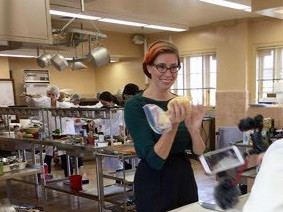Overview
Professor Drew Hays received her bachelors in Nutritional Sciences from UT-Austin. She then completed her dietetic internship to become a Registered Dietitian (RD) at the University of Houston and came back to UT to obtain her master's degree in Nutritional Sciences. She also holds a degree in Culinary Arts and is a professionally trained chef. Originally, professor Hays thought that as a RD and chef, her path would lean more towards food service dietetics, but her interests led her to clinical nutrition. In acute care she worked with patients with various nutrition-related diseases such as diabetes, vascular, and kidney disease, and managed medical nutrition therapy with a multidisciplinary team for complex medical issues such as trauma, and critical care patients. So, while she has integrated food and cooking into her expertise, her early career as a Registered Dietitian was clinically focused.
What Prompted Professor Hays to Become a RD?
Professor Hays made the decision to become an RD after working at the Food Network in New York City, and while working as the Executive Chef of a wilderness lodge in Alaska, where her growing passion for nutrition was not being realized. There was no scientific backing or evidence-based research used to validate nutrition related beliefs that served as a foundation for menus, so she was inspired to grow her own scientific understanding of nutrition which led her to return to school to obtain her RD.
Interests and Skills
Spending most of her career so far as a professional chef and clinical dietitian, Professor Hays states that her "understanding of food has really merged into my own interests in food science." Over the past few years, she has developed a profound interest in Culinary Medicine. In fact, Professor Hays and Dr. Molly Bray have worked together to instruct an elective course in which medical students are taught how to integrate research in nutrition into actual food preparation. Their goal is to teach future physicians how to interpret nutrition knowledge in order to guide their patients to sound nutrition and effective food preparation. The success of this course has led to the development of a Master's Degree in Culinary Medicine for Medical students.
MSNS Highlights
Professor Hays is a faculty member for the online Master's of Nutritional Sciences program at UT-Austin teaching the course 'Nutrition as Medicine.' The class is designed in a way that students study each group, such as beans and legumes, nuts and seeds, protein foods, etc. and break them down into compounds commonly found within to understand their function, potential health benefits and possible synergy within the food matrix. Essentially, the ultimate goal of the course is having students look at the bioactive compounds and see how they can be potentially therapeutic for certain conditions of interest, such as determining if certain food compounds or combinations possess anti-cancer effects. An important focus of the course is dosed response and if it is translatable to humans. For example, Professor Hays poses the question, "Can you eat enough turmeric to cure cancer?" and follows up with, "The answer is no, but maybe we can make overarching dietary changes to improve overall health."
What Makes UT-Austin's MSNS Program Stand Out from Other Programs?
Professor Hays says "the courses we offer are so unique, and they are taught by real experts in the field, so students are exposed a lot of cutting-edge science. We are all bringing our own expertise to the table in areas we are passionate about and deal with every day, and that is what really makes us special. Additionally, I think it's awesome how students can complete the program in one or two years- the program offers a lot of flexibility that can help fit the needs of many individuals."
Key Takeaway
"Be flexible!" Professor Hays states, "Like I mentioned, coming into nutrition, I thought for sure I was going to do food service and that would be the end of it, but here I am now. I ended up going to graduate school, and I was in a cancer lab, and then I worked in the hospital. So, just kind of following the opportunities has really kind of molded me into the nutrition expert that I never expected to be."









